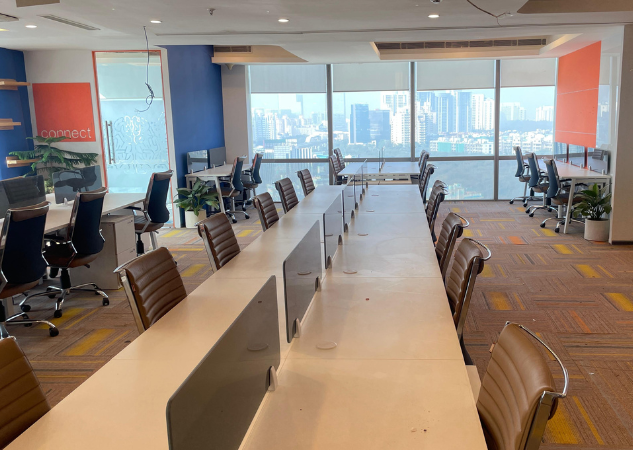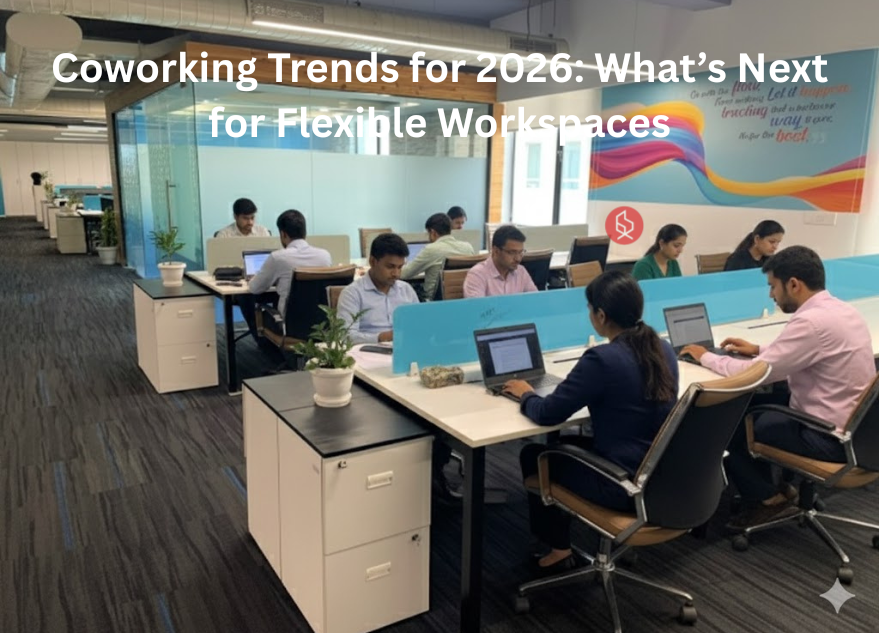Coworking spaces have become an essential part of modern work culture. As we look ahead to 2026, the landscape of coworking is set to change even more.
💡 Are you looking for Coworking space in Gurgaon, Noida or Delhi? We are just a call away. Call Now: 08999 828282
Top 10 Coworking Trends to Watch in 2026
- Rise of Hybrid Work Models
- Focus on Health and Wellness
- Smart and Sustainable Workspaces
- Greater Customization and Personalization
- Expansion of Niche and Industry-Specific Spaces
- Enhanced Networking and Community Building
- Integration of Advanced Collaboration Tools
- Flexible Membership and Pricing Models
- Global Connectivity and Remote Work Hubs
- Focus on Learning and Professional Development
1. Rise of Hybrid Work Models
One of the strongest coworking trends in 2026 is the continued growth of hybrid work models. Many companies now allow employees to split their time between working from home, coworking spaces, and traditional offices. This flexibility suits the changing preferences of workers who want a balance between collaboration and focus time.
Coworking spaces will evolve to support hybrid work by offering advanced technology, private meeting rooms, and quiet zones. This trend means more people will use coworking spaces not just occasionally, but regularly as part of their work routine. Businesses will benefit from cost savings and higher employee satisfaction, while workers enjoy a more adaptable work-life balance.

2. Focus on Health and Wellness
The future of coworking includes a strong emphasis on health and wellness. In 2026, coworking spaces will feature more natural lighting, air purification systems, and ergonomic furniture to improve physical well-being. Mental health support will also become a priority, with spaces designed to reduce stress and promote mindfulness.
This trend will attract workers who value a healthy work environment, leading to better productivity and job satisfaction. Expect to see amenities like fitness areas, meditation rooms, and wellness workshops becoming common offerings. Employers may also choose spaces with wellness programs to enhance employee retention and create a positive work culture.
3. Smart and Sustainable Workspaces
Technology and sustainability will be at the heart of coworking trends 2026. Smart sensors and IoT (Internet of Things) will help optimize energy use, manage space efficiently, and provide data-driven insights to improve user experience. Sustainable building materials and green energy sources will also become more common.
These eco-friendly measures appeal to businesses and individuals concerned about their environmental impact, helping coworking spaces stay relevant and responsible. Spaces may integrate solar panels, automated lighting, and energy monitoring systems to create greener operations while reducing operating costs for members and owners.
Also Read: Top 10 Future Trends of Coworking Spaces
4. Greater Customization and Personalization
In 2026, coworking spaces will offer more customization options to meet the diverse needs of workers. From adjustable desks to flexible membership plans, spaces will allow users to personalize their work environment according to their preferences and work styles.
This trend supports everyone from freelancers to large teams, making coworking a more inclusive and effective option for different types of work and schedules. Personalized spaces can include dedicated lockers, personalized tech setups, or customized layouts for teams, ensuring that every user feels comfortable and productive.
5. Expansion of Niche and Industry-Specific Spaces
The future of coworking will see a rise in niche coworking spaces tailored to specific industries or communities. For example, spaces designed specifically for creatives, tech startups, or legal professionals will become popular. These specialized environments foster networking, collaboration, and learning among people with shared interests.
This approach creates stronger community bonds and adds more value than generic coworking spaces. Niche spaces may also offer specialized equipment, curated workshops, and mentorship programs that are unique to each industry, enabling members to develop skills relevant to their careers.
6. Enhanced Networking and Community Building
Networking has always been a key benefit of coworking, but in 2026, the focus on building strong, supportive communities will be even greater. Coworking spaces will host more events, workshops, and social activities designed to connect members and encourage collaboration.
This trend helps workers build professional relationships, gain new opportunities, and stay motivated through social support. By attending these community events, members can exchange ideas, collaborate on projects, and gain insights from peers in similar or complementary industries, creating a vibrant ecosystem for growth.
7. Integration of Advanced Collaboration Tools
Coworking spaces in 2026 will integrate advanced collaboration tools such as virtual whiteboards, cloud-based project management software, and AI-driven scheduling systems. These tools make it easier for remote and on-site teams to work together efficiently, even across different time zones.
By embracing these technologies, coworking operators can enhance productivity, simplify workflow management, and create seamless communication channels. Members benefit from a professional environment where technology supports creative collaboration, faster decision-making, and more efficient project execution.
8. Flexible Membership and Pricing Models
The future of coworking will feature more flexible membership options tailored to meet diverse professional needs. Pay-as-you-go, part-time, and customizable packages will enable individuals and companies to select plans that align with their work habits and budget constraints.
This trend makes coworking accessible to a broader audience, including startups, freelancers, and large corporations. Flexible pricing also encourages trial usage, attracting new members who may eventually transition to long-term subscriptions. Operators benefit from increased occupancy rates and member satisfaction.
💡 Are you looking for Coworking space in Gurgaon, Noida or Delhi? We are just a call away. Call Now: 08999 828282
9. Global Connectivity and Remote Work Hubs
In 2026, coworking spaces will continue to cater to digital nomads and global teams by providing connected hubs in multiple cities. Members will enjoy seamless access to spaces worldwide, allowing them to work productively while traveling or relocating temporarily.
This trend enhances professional mobility and ensures that workers can maintain routine, collaboration, and productivity regardless of location. Companies can support employees in multiple geographies while reducing dependency on traditional offices, contributing to a more agile and distributed workforce.
10. Focus on Learning and Professional Development
Coworking spaces will increasingly offer learning opportunities, such as workshops, mentorship programs, and skills training sessions. By integrating professional development into their services, spaces will help members grow in their careers while connecting them with industry experts and peers.
This trend transforms coworking into more than just a physical space it becomes a hub for continuous learning and growth. Members gain access to knowledge, networks, and resources that enhance career advancement, innovation, and personal development within a collaborative environment.
The coworking landscape is set for exciting changes in 2026, with flexibility, technology integration, and hybrid models shaping the future of workspaces. Platforms like The Office Pass (TOP) make it easy to access premium coworking spaces on demand, across cities, without long-term commitments. Stay ahead by leveraging TOP to enjoy flexible, productive work environments. For more details or to book your workspace, contact TOP at 8999 828282 today.
FREQUENTLY ASKED QUESTIONS (FAQS):
Question: What are the main benefits of coworking spaces in 2026?
Answer: In 2026, coworking spaces will offer more flexibility, enhanced health and wellness features, sustainable environments, and stronger community connections. These benefits improve work-life balance and productivity. Members can enjoy ergonomic workstations, collaborative opportunities, and amenities that support both physical and mental well-being.
Question: How will technology change coworking spaces?
Answer: Technology like smart sensors, IoT, and virtual collaboration tools will make coworking spaces more efficient and user-friendly. They help manage space use, ensure safety, and connect remote and on-site workers seamlessly. Technology also enables data-driven decisions to optimize layouts, lighting, and energy consumption.
Question: Are niche coworking spaces better than general ones?
Answer: Niche coworking spaces offer tailored resources and community for specific industries, which can be very valuable. General spaces provide more diversity in networking. The best choice depends on your work style, goals, and the type of collaboration or learning you want from your work environment.
Question: Will coworking spaces replace traditional offices?
Answer: While coworking spaces will continue to grow, they will likely complement traditional offices rather than replace them entirely. Many companies will use a mix of remote, coworking, and in-office work to support hybrid work models, balancing flexibility with structured operations.
Question: How do coworking spaces support mental health?
Answer: Coworking spaces in 2026 will prioritize mental health with quiet zones, meditation rooms, and wellness workshops. Natural lighting, ergonomic furniture, and air quality improvements reduce stress, while social events foster a supportive community. These measures enhance focus, motivation, and overall job satisfaction.
Question: What makes a coworking space sustainable?
Answer: Sustainable coworking spaces use eco-friendly materials, green energy, and efficient technology like smart sensors to reduce energy waste. They implement recycling programs, water conservation systems, and sustainable design principles. This appeals to environmentally conscious members and reduces operating costs.
Question: How do coworking spaces support hybrid work?
Answer: Coworking spaces support hybrid work by offering private rooms, flexible seating, and advanced collaboration technology. They allow employees to work outside traditional offices while maintaining connectivity with teams. This flexibility helps workers balance focus time, collaboration, and personal preferences.
Question: Can coworking spaces help with professional development?
Answer: Yes. Many coworking spaces offer workshops, mentorship, and training sessions. Members gain access to learning opportunities, networking, and industry insights. This approach promotes skill growth, innovation, and career advancement within a collaborative environment.
Question: Are flexible membership plans beneficial?
Answer: Flexible plans, like pay-as-you-go or part-time memberships, make coworking accessible to freelancers, startups, and large teams. They allow members to adjust usage according to need and budget. Flexibility also encourages trial usage, long-term subscriptions, and better resource utilization.
Question: How do coworking communities improve networking?
Answer: Strong coworking communities facilitate professional connections through events, workshops, and social activities. Members can collaborate, exchange ideas, and find opportunities for growth. A supportive community enhances motivation, learning, and engagement, creating a vibrant and productive environment.



